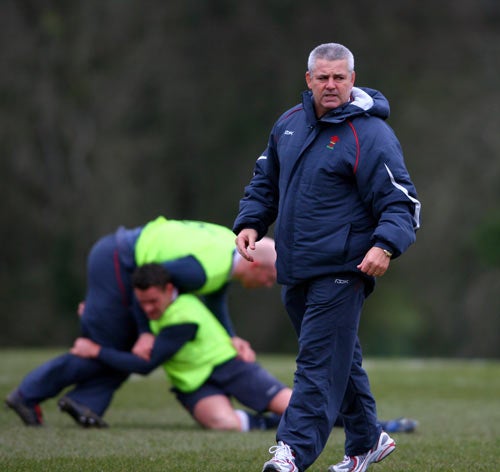Alun Carter: Six Nations Analysis
Crunching Dragons and a wilting Red Rose try count

PHYSICAL WALES
A key ingredient in Wales' recipe for success is physicality on the training field. It is no coincidence that teams like England (in 2002 and 2003), Toulouse, Leicester and, of course, Wasps have training sessions where they knock seven bells out of each other. Gareth Jenkins tried this approach with Wales but was persuaded to drop it by reticent players who wanted an easier ride. There is nowhere for them to run now with Warren Gatland's hard-line approach, and the rewards are plain to see with teams falling away from them in the last quarter.
ENGLAND'S FALTERING ATTACK
Away from three disastrous second-half performances there were glimmers of light. With just five tries conceded, England's defence were the second best in the championship. Their attack play continues to falter with 16 tries scored in 2005, 12 tries in 2006, 10 in 2007 and eight this season. It is a worrying trend. A combination of Danny Cipriani and Jonny Wilkinson in the same backline could provide the ingenuity that Brian Ashton is craving. England would have finished third in the table on try differential; it was the goal-kicking and penalty strikes that helped them to keep ahead of the French.
FRENCH REVOLUTION
Marc Livremont has brought back some of the traditional virtues of French play but with poor selection has compromised the forward power of the team. Les Bleus made the highest number of passes but often played too much in their own half putting pressure on themselves. To compete at the top end of world rugby Livremont needs to develop a better game management policy for his team and select proven forwards like Sylvain Marconnet.
IRISH AMENDMENT
The game plan and profile changes dramatically from game to game and sometimes even within a game. Against France and England, the Irish made 174 and 137 passes respectively. Against Scotland and Wales they made 76 and 75 passes respectively. This brings with it a totally differing approach. They chased the game away from home but had the chance of making a bold statement against the Welsh but failed to do so.
ITALIAN MUSCLE
The scoring profile of the Azzuri reflects their philosophy. All 6 tries came from 1 phase - driving lineouts, pressure defence and a strong scrum. Their attempts to move the ball from touch line to touch line and stretch teams often broke down because of a lack of skill or the insistence of Nick Mallet to play Masi at 10. He lies so deep that it puts pressure on the Italian attack.
SCOTTISH STRIFE
Scotland impress up front with a good line out and improving scrum. The amount of handling errors (highest in the tournament) reflects on some players who struggle at this level and with a game plan that involves a high number of passes. Whilst the Scots had the joint worst defence of the Championship, conceding 13 tries (same as Italy) their attack was woeful with just 3 tries scored. Chris Paterson's phenomenal strike rate on goal helped confine Italy to the wooden spoon, on try differential they would clearly have been bottom.
Join our commenting forum
Join thought-provoking conversations, follow other Independent readers and see their replies
Comments
Bookmark popover
Removed from bookmarks